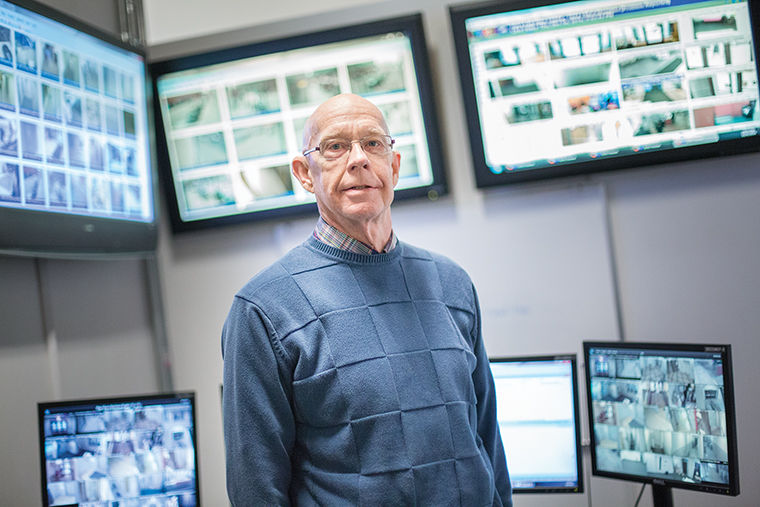VP of Security to retire in January 2015
Robert Koverman, associate vice president of Security, plans to retire effective January 2015 after six years of serving the college and students.
December 8, 2014
The campus community will return for the Spring 2015 semester sans a familiar face in the Office of Campus Safety and Security.
Robert Koverman, associate vice president of Security, is set to retire from the college, effective early January 2015.
Koverman is best known for creating the Central Command Center in collaboration with the college’s desire to have the college’s Media Production Center be a state of the art facility. He also advanced the college’s security systems.
“It started with the idea of implementing a very robust security system for the MPC that would not only manage the security and technology infrastructure for the MPC but for the entire campus for years to come,” Koverman said. “It was just kind of a natural progression. Once you begin to operationally develop the kinds of things that we were doing, the natural movement from that point on is to technologically be advanced with your operations.”
Koverman, who has a law enforcement and security background, has a bachelor’s degree and master’s degree in criminal justice. He is a former police chief in Ohio and worked as the executive director of Protective Services at the Art Institute of Chicago for 12 years. He credits his extensive background as to why he was well prepared for his position with Columbia, which he assumed in 2009.
“Looking over my years of experience and some of the diverse positions that I’ve had, I thought that my background could be very beneficial to both me and Columbia,” Koverman said.
Koverman said a 2012 ranking by Security Magazine named Columbia’s security department as one of the top 500 security departments in the country, one of the highlights in his time with the college.
Koverman, who is approaching his 48th year in law enforcement and security work, also received the Robert Burke Award in 2002 for excellence in cultural property protection. He also assisted the college with being ranked No. 6 nationally as a higher education security organization and educational facility.
“In terms of Columbia College and my tenure here, that was certainly an award that was a highlight,” Koverman said. “That is due to my whole team and the support that Columbia has given us.”
Alicia Berg, vice president of Campus Environment, said the creation of Koverman’s position was the first step in making the college safer, and she said Koverman was the perfect choice based on his background.
“He understood how to work, had a sense of perspective and he had a broad enough experience that he knew how to propose the right solution for the issue,” Berg said. “[In that way] he was a calming influence of people.”
Berg said Koverman implemented heightened security training during college-wide faculty and staff orientations, as well as regular training of his security staff to be prepared to manage emergencies on campus. The behind-the-scenes work he has been able to set in place is what made a major difference in how secure students, faculty and staff all feel at Columbia.
“He’s really been able to create partnerships and people think that what has been instituted makes sense and is working,” Berg said. “It is also a testament to the quality of the work.”
Susan Marcus, associate vice president of Academic Affairs, said Koverman’s focus on students and applying his knowledge is what made for such a successful relationship between his staff, the college and his work.
“He is student-centered,” Marcus said. “He built the various projects and plans [so] that we now have an organized way to handle any kind of incident or emergency. He brought professionalism, information and expertise.”
Marcus said Koverman never alienated his staff. She said he always remained clear and conversational with the information he provided and maintained a great rapport with his colleagues.
Through a series of exercises and scenarios, Marcus said there was an increased sense of comfortability and confidence that Koverman offered his staff. She said his knowledge and ways of expressing the systems translated best to his team and his plans were trusted.
“The plans and systems that he made for us take into account how things may affect students and what it will mean to them,” Marcus said. “He would raise the issue of students all the time in terms of making sure that we’re keeping our campus safe and we can always resume our academics as quickly as possible.”








